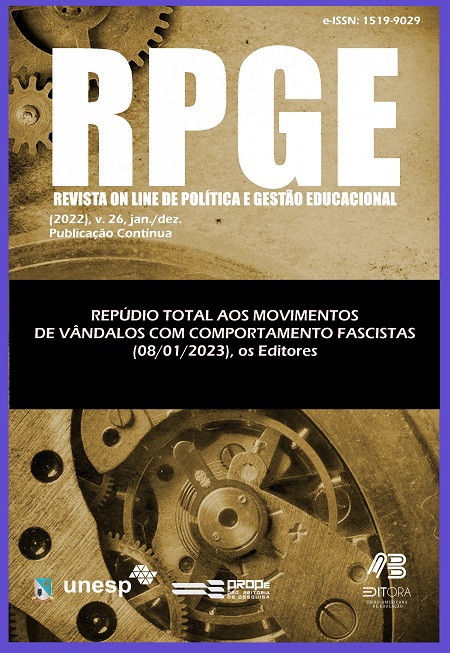Formación de la imagen del mundo durante la transformación digital de la educación
DOI:
https://doi.org/10.22633/rpge.v26i00.16469Palabras clave:
Imagen del mundo, Imagen profesional del mundo, Transformación digital de la educación, Tecnologías digitales, Entorno educativo digitalResumen
La formación de la imagen del mundo en una persona en cada etapa etaria de su desarrollo es un problema relevante debido al carácter multidisciplinario y único de este fenómeno. Este artículo se centra en el concepto de imagen profesional del mundo y revela su integridad y consistencia en las visiones generalizadas de los futuros docentes sobre el proceso de aprendizaje. Los autores consideraron el problema de investigación desde la perspectiva de la transformación digital global de la educación. Para evaluar las manifestaciones, los niveles y la calidad de la imagen formada del mundo del individuo durante la transformación digital de la educación, los autores realizaron un experimento en la Universidad Estatal de Yelets Bunin. La investigación es de utilidad para los educadores que diseñan los contenidos, tecnologías y herramientas de gestión para la formación profesional de un futuro docente.
Descargas
Citas
ANDRYUKAITENE, R. et al. Formation and development of SMART-society as a highly intelligent, high-tech, and highly intellectual. Humanities Bulletin of the Zaporizhzhia State Engineering Academy, v. 71, p. 17-25, 2017.
ANTONOVA, D. A.; OSPENNIKOVA, E. V.; SPIRIN, E. V. Digital transformation of the education system. Developing resources for a modern digital learning environment is one of its main directions. Bulletin of the Perm State Humanitarian Pedagogical University, Series: Information Computer Technologies in Education, v. 14, p. 5–37, 2018.
ARTEMYEVA, E. Yu. Fundamentals of the Psychology of Subjective Semantics. Moscow: Nauka, 1999.
BEETHAM, H.; SHARPE, R. Rethinking Pedagogy for a Digital Age: Designing for 21st Century Learning. Routledge Falmer, 2013.
BORONENKO, T.A.; KAISINA, A. V.; FEDOTOVA, V. S. Developing digital literacy of schoolchildren using the designed digital educational environment. Perspectives of Science and Education, v. 2, n. 38, p. 167-193, 2019.
CLARK-WILSON, A.; ROBUTTI, O.; SINCLAIR, N. The mathematics teacher in the digital era: An international perspective on technology-focused professional development. Technology, Knowledge and Learning, v. 19, p. 249–253, 2014.
DEVELOPMENT STRATEGY. Development Strategy of the Information Society in the Russian Federation from 2017 to 2030. Available: https://sudact.ru/law/ukaz-prezidenta-rf-ot-09052017-n-203/strategiia-razvitiia-informatsionnogo-obshchestva-v/
DICTIONARY. A Reference Book of Normative and Technical Terms. Available: http://normative_reference_dictionary.academic.ru
GOLOVANOVA, N. F. General Pedagogy. Moscow: Rech, 2005.
IGNATOVA, N. Yu. Education in the Digital Age. Monograph. Nizhny Tagil: NTI (branch) of UrFU, 2017.
INSTEFJORD, E. J.; MUNTHE, E. Educating digitally competent teachers: A study of integrating professional digital competence in teacher education. Teaching and Teacher Education, v. 67, p. 37-45, 2017.
JUNG, C. G. Problems of the Soul of Our Time. St. Petersburg: Peter, 2002.
KUH, G. D. The other curriculum: Out-of-class experiences associated with student learning and personal development. Journal of Higher Education, v. 66, p. 123-155, 1995.
MASHEVSKAYA, O. V. Digital technologies as the basis for the digital transformation of modern society. Bulletin of Polesie State University, v. 1, p. 37-44, 2020.
MCINNIS, C. Researching the first-year experience: Where to from here? Higher Education Research and Development, v. 20, n. 2, p. 105-114, 2011.
MOROZOV, A. V.; SAMBORSKAYA, L. N. Teacher professionalism as the most important resource and determinant of education quality in the digital educational environment. Kazan Pedagogical Journal, v. 6, n. 131, p. 43–48, 2018.
PEREVALOV, V. D. et al. Digitalization of Russian higher education: Educational process technologies (experience of universities of the Ural Federal District of Russian Federation). Perspectives of Science and Education, v. 46, n. 4, p. 36-46, 2020.
PROKHOROV, A.; KONIK, L. Digital Transformation. Analysis, Trends, Global Practices. Moscow: OOO AlliancePrint, 2019.
ROMANOV, E.V. Higher education: Current state and development prospects. Ekonomicheskaya Politika, v. 13, n. 3, p. 182-205, 2018.
RUSEVICH, V.V. Pedagogical conditions for building the world's image in children aged five to seven years old. Author’s Abstract of the Dissertation of the Candidate of Pedagogical Sciences. Volgograd, 2009.
SASSIN, W. De-creation of creation, or a new level of culture in the development of homo. The Beacon: Journal for Studying Ideologies and Mental Dimensions, v. 2, 020510203, 2019.
SASSIN, W. Globalisation and digitisation - the exponential spread of infectious information and its possible containment. The Beacon: Journal for Studying Ideologies and Mental Dimensions, v. 3, 010510201, 2020.
SENKO, Yu. V. The professional image of the teacher’s world and their pedagogical culture. Pedagogy, v. 2, p. 63-68, 2011.
SERKIN, V. P. The relationship between the image of the world and lifestyle. The world of Psychology: Scientific and Methodological Journal, v. 4, n. 60, p. 109-119, 2009.
ZHELEZNYAKOVA, O. M.; DYAKONOVA, O. O. The essence and content of the concept of “edutainment” in Russian and international pedagogical science. Alma Mater (Bulletin of the Higher School), v. 2, p. 67-70, 2013.
Descargas
Publicado
Cómo citar
Número
Sección
Licencia
Derechos de autor 2022 Revista on line de Política e Gestão Educacional

Esta obra está bajo una licencia internacional Creative Commons Atribución-NoComercial-CompartirIgual 4.0.
Manuscritos aceitos e publicados são de propriedade da Revista on line de Política e Gestão Educacional. É vedada a submissão integral ou parcial do manuscrito a qualquer outro periódico. A responsabilidade do conteúdo dos artigos é exclusiva dos autores. É vedada a tradução para outro idioma sem a autorização escrita do Editor ouvida a Comissão Editorial Científica.










